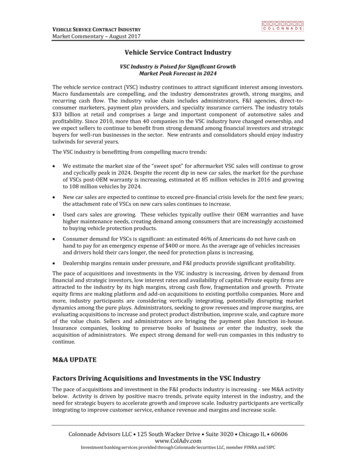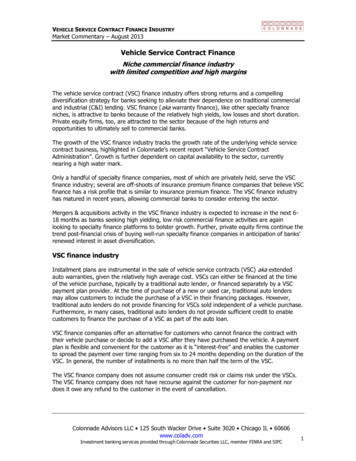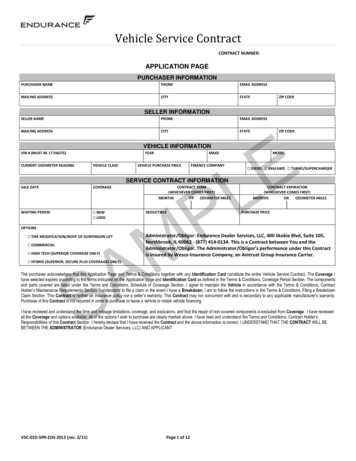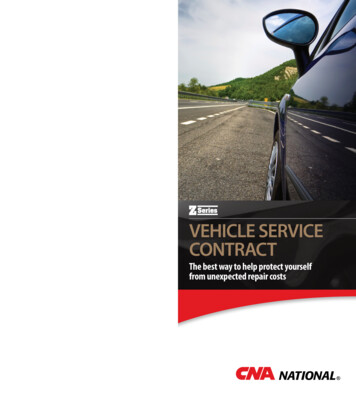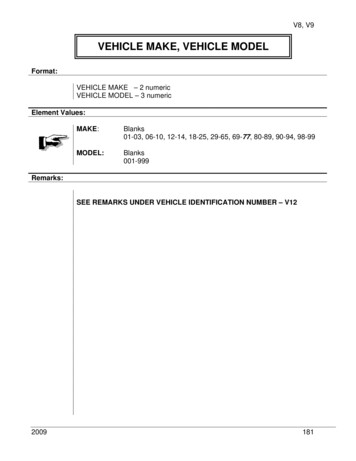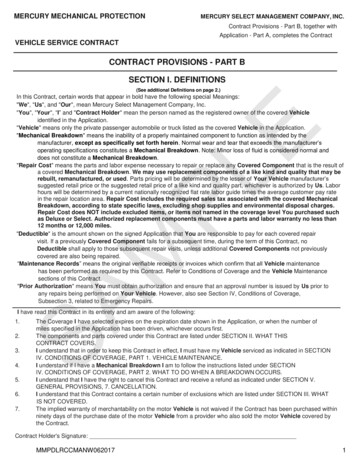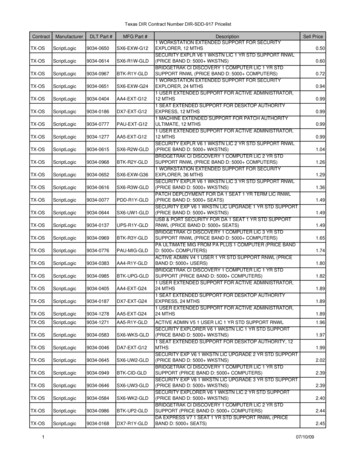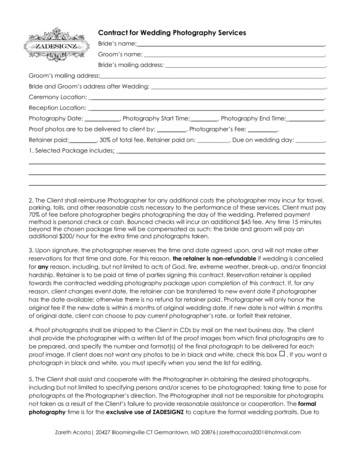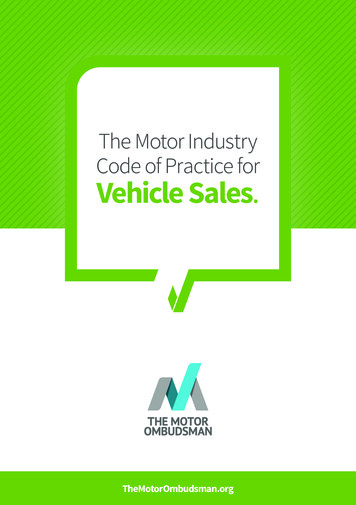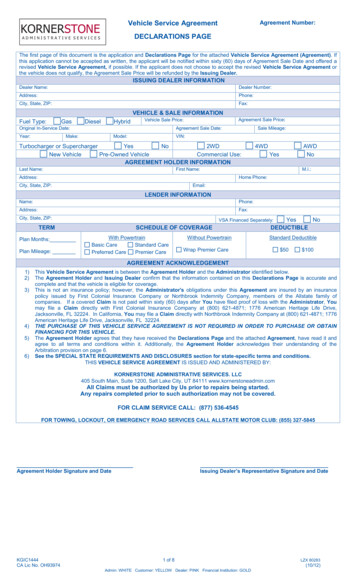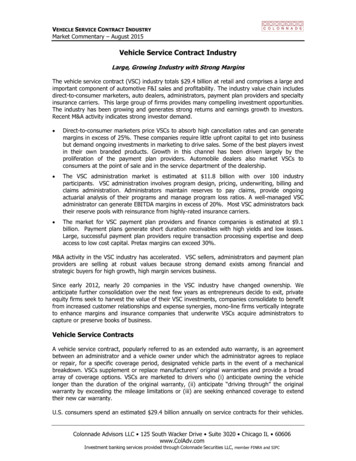
Transcription
VEHICLE SERVICE CONTRACT INDUSTRYMarket Commentary – August 2015Vehicle Service Contract IndustryLarge, Growing Industry with Strong MarginsThe vehicle service contract (VSC) industry totals 29.4 billion at retail and comprises a large andimportant component of automotive F&I sales and profitability. The industry value chain includesdirect-to-consumer marketers, auto dealers, administrators, payment plan providers and specialtyinsurance carriers. This large group of firms provides many compelling investment opportunities.The industry has been growing and generates strong returns and earnings growth to investors.Recent M&A activity indicates strong investor demand. Direct-to-consumer marketers price VSCs to absorb high cancellation rates and can generatemargins in excess of 25%. These companies require little upfront capital to get into businessbut demand ongoing investments in marketing to drive sales. Some of the best players investin their own branded products. Growth in this channel has been driven largely by theproliferation of the payment plan providers. Automobile dealers also market VSCs toconsumers at the point of sale and in the service department of the dealership. The VSC administration market is estimated at 11.8 billion with over 100 industryparticipants. VSC administration involves program design, pricing, underwriting, billing andclaims administration. Administrators maintain reserves to pay claims, provide ongoingactuarial analysis of their programs and manage program loss ratios. A well-managed VSCadministrator can generate EBITDA margins in excess of 20%. Most VSC administrators backtheir reserve pools with reinsurance from highly-rated insurance carriers. The market for VSC payment plan providers and finance companies is estimated at 9.1billion. Payment plans generate short duration receivables with high yields and low losses.Large, successful payment plan providers require transaction processing expertise and deepaccess to low cost capital. Pretax margins can exceed 30%.M&A activity in the VSC industry has accelerated. VSC sellers, administrators and payment planproviders are selling at robust values because strong demand exists among financial andstrategic buyers for high growth, high margin services business.Since early 2012, nearly 20 companies in the VSC industry have changed ownership. Weanticipate further consolidation over the next few years as entrepreneurs decide to exit, privateequity firms seek to harvest the value of their VSC investments, companies consolidate to benefitfrom increased customer relationships and expense synergies, mono-line firms vertically integrateto enhance margins and insurance companies that underwrite VSCs acquire administrators tocapture or preserve books of business.Vehicle Service ContractsA vehicle service contract, popularly referred to as an extended auto warranty, is an agreementbetween an administrator and a vehicle owner under which the administrator agrees to replaceor repair, for a specific coverage period, designated vehicle parts in the event of a mechanicalbreakdown. VSCs supplement or replace manufacturers’ original warranties and provide a broadarray of coverage options. VSCs are marketed to drivers who (i) anticipate owning the vehiclelonger than the duration of the original warranty, (ii) anticipate “driving through” the originalwarranty by exceeding the mileage limitations or (iii) are seeking enhanced coverage to extendtheir new car warranty.U.S. consumers spend an estimated 29.4 billion annually on service contracts for their vehicles.Colonnade Advisors LLC 125 South Wacker Drive Suite 3020 Chicago IL 60606www.ColAdv.comInvestment banking services provided through Colonnade Securities LLC, member FINRA and SIPC
VEHICLE SERVICE CONTRACT INDUSTRYMarket Commentary – August 2015VSCs are typically marketed at three points in the life cycle of an automobile: (i) at original sale(the new vehicle segment – extended warranties), (ii) near or after expiration of factory warrantyprimarily via direct-to-consumer sales (the end-of-warranty segment) and (iii) at resale (the usedvehicle segment).VSC Market etersandDealershipsLenders andPayment PlanProvidersAdministratorsInsurers New and used vehicle owners purchase VSCs for a specific coverageduring a defined period. Customers seek coverage for a term after the original carmanufacturer’s warranty expires or to enhance factory warrantycoverage. Market and sell contracts on behalf of administrators and earn acommission. Direct-to-consumer marketers: Reach potential buyers throughdirect mail, television, radio and Internet advertising. Dealerships: Sell to customers through F&I department at point ofsale and in the service lane at franchised and independent dealers.F&I agents are frequently intermediaries between administrators anddealerships. Independent F&I agents are highly fragmented and rangein size from large groups with regional/national coverage to small F&Iagent firms with a single client. Examples of DTC marketers: Endurance and Repair Defense Network. Lenders: Finance a VSC at point-of-sale at dealerships by includingthe price of the VSC in the underwritten auto loan which is reported tothe credit bureaus. The customer is liable to the lender for payment. Payment plan providers: Flexible and convenient for the consumeras it is interest-free and enables the customer to spread the paymentover time ranging from six to 24 months. Non-recourse to theconsumer. VSC seller is liable for the payment. Examples of independent payment plan providers: PayLink, Omnisureand Mepco. Responsible for program design, pricing, underwriting, and billing andclaims administration. Market to dealerships through a direct sales force or throughindependent F&I agents. Maintain reserves to pay claims, provide ongoing actuarial analysis ofclaims and refunds and manage program loss ratios. Administrators include captives of insurance carriers, captives ofvehicle manufacturers and independent third parties. Examples: APCO (independent third-party), Toyota Financial Services(Toyota), Warrantech (AmTrust). Provides a contractual liability policy ("CLIP") to guaranty performanceof the VSC in the event that the administrator goes out of business oris unable to pay claims. The administrator pays the insurer a premium and a fee. The premiumis allocated to a trust and claims are netted against the trust. If claimsexceed the trust, the insurer is liable to pay the claims. Examples: AmTrust, Assurant, Virginia Surety (Warranty Group).Colonnade Advisors LLC 125 South Wacker Drive Suite 3020 Chicago IL 60606www.ColAdv.comInvestment banking services provided through Colonnade Securities LLC, member FINRA and SIPC
VEHICLE SERVICE CONTRACT INDUSTRYMarket Commentary – August 2015Industry Trends Are FavorableVSCs are sold to consumers at various points in the lifecycle of a vehicle: at the time of originalsale, at the time of a used sale and at the end-of-warranty. VSC sales on new and used vehiclesoccur at the franachise and independent dealerships. End-of-warranty sales are directlymarketed to consumers.New VehiclesFavorable industry trends are driving VSC sales for new vehicles as the new car market isincreasing in size and the adoption rate of VSCs has increased markedly over the past decade. Since the recession, new vehiclesales have rebounded, expanding themarket for VSCs. New car sales grewto 16.4 million units in 2014, thehighest level since 2006 and areexpected to increase to 16.9 millionunits in 2015. New vehicles are sold through morethan 18,400 franchised dealers in theU.S. Dealers sell VSCs to supplementthe OEM's warranty and boost F&Iincome. Dealerships have been turning to thesale of VSCs and other ancillaryproducts to increase profits. VSCincome accounts for roughly 16% oftotal dealer profits. Recently, the VSC industry hasbenefited as GM has reduced thelength of its factory warranty. TheGM five year/100,000 miles powertrain coverage is being reduced tofive year/60,000 miles. GM has alsochanged its free maintenance fromfour visits per year to two visits forthe first two years.Colonnade Advisors LLC 125 South Wacker Drive Suite 3020 Chicago IL 60606www.ColAdv.comInvestment banking services provided through Colonnade Securities LLC, member FINRA and SIPC
VEHICLE SERVICE CONTRACT INDUSTRYMarket Commentary – August 2015Used VehiclesUsed vehicle sales are robust and dealerships are actively selling VSCs to enhance their margins. The market for used vehicles is2.6 times the size of the newvehicle market on a unit basis,reaching 42.1 million units soldin 2014. Used vehicles are sold throughmore than 36,000 independentand franchised dealers. Private sales accounted forabout 12.5 million units in 2014,roughly 30% of the market.End-of-WarrantyThe end-of-warranty market is experiencing strong growth in VSC sales. Consumers are holding theirvehicles for longer periods: anaverage of 7.75 years in 2014,according to Experian, comparedto four years in 2001, accordingto IHS. More older vintage vehicles arecoming off OEM warranty priorto a change in ownership. In 2014, there were 98 millioncars on the road between modelyears 2002 and 2008. Buyers of new cars typically“drive through” the mileage limiton a three-year warranty in twoand a half years and within fouryears on a five-year warranty. As new car sales have recoveredbetween 2010-2014, the outlookfor end-of-warranty VSC saleslooks increasingly favorable.Colonnade Advisors LLC 125 South Wacker Drive Suite 3020 Chicago IL 60606www.ColAdv.comInvestment banking services provided through Colonnade Securities LLC, member FINRA and SIPC
VEHICLE SERVICE CONTRACT INDUSTRYMarket Commentary – August 2015The Vehicle Service Contract Industry is LargeSince our commentary issued in 2013, we have refined our thoughts on market size.Retail Market SizeColonnade estimates the total retail market for VSCs at 29.4 billion in 2014. We estimate theaddressable market for the independent companies at 19.6 billion.AdministratorsColonnade estimates the total administrator market for VSCs at 11.8 billion and the addressablemarket for the independent companies at 7.8 billion.Colonnade Advisors LLC 125 South Wacker Drive Suite 3020 Chicago IL 60606www.ColAdv.comInvestment banking services provided through Colonnade Securities LLC, member FINRA and SIPC
VEHICLE SERVICE CONTRACT INDUSTRYMarket Commentary – August 2015Payment Plan ProvidersWhen utilizing a payment plan, a consumer typically makes a downpayment of 10% and thebalance is financed. Colonnade estimates the total financing market for VSCs at 9.1 billion. Theaddressable market for independent payment plan providers is estimated at 3.5 billion.Business Model DifferentiationThere are multiple segments in the VSC industry and companies use varied business models.There are pure play companies in each of the industry segments and others that integratemultiple segments, as demonstrated in the example below.Colonnade Advisors LLC 125 South Wacker Drive Suite 3020 Chicago IL 60606www.ColAdv.comInvestment banking services provided through Colonnade Securities LLC, member FINRA and SIPC
VEHICLE SERVICE CONTRACT INDUSTRYMarket Commentary – August 2015Direct-to-Consumer MarketersThere are at least 90 direct-to-consumer marketing companies in the U.S. focused on the VSCindustry. These companies use three primary origination channels: direct mail, Internet andtelevision/radio. The direct-to-consumer marketers are typically marketing on an unbrandedbasis, but a few are working to establish their own brand, which requires significant monetaryinvestment and time. Compared to sales through dealerships, direct-to-consumer marketersexperience higher cancellation rates (in the 40%-60% range), including cancels during the firstmonth post-sale. Dealerships, which are rolling the VSC financing into the vehicle loan, typicallyexperience a cancellation rate of 5%-10%. The cancellation risk is priced into the VSC. As thedirect-to-consumer marketing companies have higher expense levels associated with marketingcosts and cancellations compared to the dealership sales, their contracts are generally pricedhigher.Direct mail is the largest channel and most well established. Direct mail requires the developmentand acquisition of consumer lists, marketing response models and materials testing. Many directmail marketers send out unbranded pieces ascribed to "your motor vehicle department".Consequently, compared to the other channels, average call times and conversion rates are loweras consumers are responding to the receipt of the piece of mail and are not necessarily ready topurchase. The low conversion rates can be improved upon by using branded marketing pieces.Overall, direct mail is an effective channel for the direct-to-consumer marketers.Internet marketing generates more informed customer leads. Potential customers have theopportunity to engage in product research and price discovery, resulting in higher conversionrates. For direct marketers, inbound calls are generally longer and yield higher sales. Internetmarketers do risk higher adverse selection which can be mitigated by extending wait periods tomake the first claim.Television and radio advertising is the least utilized channel by direct-to-consumer marketers as itis the most expensive; however, it generates higher brand awareness. In addition to driving callsinto the sales call center, television and radio advertising pushes consumers to the Internet tolearn more about the products. Thus, marketing spend efficiency ratios for television and radioadvertising should be reviewed in conjunction with Internet marketing effectiveness.As the VSC industry has matured, administrators, payment plan providers and insurers havebecome more selective in choosing direct marketing partners. Direct-to-consumer marketersneed to distinguish themselves and do so through Better Business Bureau ratings and by beingcertified by the Vehicle Protection Association (VPA). The VPA is a not-for-profit trade associationpromoting regulatory transparency, education, accountability, compliance and stability in themarketing and servicing of VSCs. The VPA created the Standards of Conduct, a uniform code todefine ethical business conduct for association members. It also certifies members via a rigorouscertification process.AdministratorsThe administrator universe is fragmented with over 100 operators. The largest administrator hasless than 8% of the total market and we estimate that the top five administrators have 30% ofthe market. Administrators are selling their products to the end consumer through dealerships orthrough direct-to-consumer marketers. To reach the dealerships, administrators utilize a directsales force and/or independent F&I agents. With an independent F&I agent sales force, theadministrator's reach is broader, however F&I agents are not exclusive and the administator cansometimes struggle for agent mindshare. The direct sales force receives salary plus commission,Colonnade Advisors LLC 125 South Wacker Drive Suite 3020 Chicago IL 60606www.ColAdv.comInvestment banking services provided through Colonnade Securities LLC, member FINRA and SIPC
VEHICLE SERVICE CONTRACT INDUSTRYMarket Commentary – August 2015whereas the independent F&I agents are compensated via a mark-up to the VSC upon sale at thedealership. Administrators also resell their products through direct-to-consumer marketers whichtypically offer their customers the products of multiple administrators.Administrators are frequently differentiated by the dealerships they address: franchise versusindependents. The franchise dealerships have greater F&I sophistication. The competitionamong administrators to establish a relationship with franchisees is higher, resulting in longersales cycles. Additionally, many franchise dealerships are interested in participations on theresidual value of VSC sales and reserves. The independent dealerships typically represent olderused cars with higher mileage, so the product offering is different from that of new cardealerships. The independents historically tended to have a lower level of techonologicalsophistication, resulting in more costly contract set-up.Administrators make the determination to be self-insured or to purchase a CLIP to reinsureclaims. Administrators that purchase CLIPs pay a premium into a trust which is jointly controlledby the insurer and the administrator. Many dealerships, as well as consumers, prefer to workwith administrators that market VSCs backed by highly-rated insurance carriers.Payment Plan ProvidersPayment plan providers generate high yielding, short term receivables. There are fewer than tenindependent firms specializing in providing VSC payment plans.A payment plan receivable originates when a buyer of a VSC (outside of the auto loan) elects topay in installments. Pursuant to a contractual agreement, a VSC finance company purchases at adiscount the right to receive the payment stream; discounts typically range from 5%-15%. Thefinance company funds a portion to the administrator and a commission payment to the seller.Disbursements are structured and timed to mitigate risk and increase yield. Yields are alsoenhanced through reserves, late fees and other service charges and early cancellations.Customers who elect to pay in installments agree to make a down payment (typically 10%) and aseries of fixed monthly payments for a period of time generally ranging from six to 24 monthsdepending on the term of the VSC. VSC finance receivables typically have an averge life of six to12 months.The payment plan receivables enjoy strong collateral as the VSC administrators are financiallyresponsible for any VSC claims. The payment plan provider does not assume consumer credit orclaims risk under the VSC.Instructuring a VSC payment plan, thedownpayment,numberofinstallments and timing of thedisbursements are set such that inthe event of cancellation, theunearned portion of the VSCreturned by the administrator andthe seller is sufficient to cover thepayment plan provider’s receivablebalance and any other charges. Asthe graph to the right illustrates, aproperly structured VSC paymentplanreceivableisalwayscollateralized in excess of theColonnade Advisors LLC 125 South Wacker Drive Suite 3020 Chicago IL 60606www.ColAdv.comInvestment banking services provided through Colonnade Securities LLC, member FINRA and SIPC
VEHICLE SERVICE CONTRACT INDUSTRYMarket Commentary – August 2015finance company’s exposure.Payment plan providers with a diversified receivables portfolio can attract significant third partyleverage to boost equity returns.Vertically Integrated VSC CompaniesThe vertically integrated business model captures incremental value in the VSC sale. This modelmay result in higher margins and lower cancellations. A direct-to-consumer marketer that is also an administrator benefits from higher margins andlower cancellation rates due to the opportunity for early intervention in a cancellationscenario as well as an enhanced customer experience. Typically, if a customer calls tocancel, he/she contacts the administrator. An integrated marketer will take the call and havethe opportunity to deploy strategies to save the relationship as opposed to handing off thecall to a third-party payment plan provider. Customers generally have an enhancedexperience with an integrated provider when making a claim as he/she is contacting thesame entity that he/she bought the VSC from. In addition, the direct-to-consumer marketeris able to remarket to the customer. An administrator or direct-to-consumer marketer that also provides payment plans eliminatesthe 5%-15% fee paid to the payment plan provider. Typically, little additional headcount isneeded to administer the payment plan, as some marketer
A vehicle service contract, popularly referred to as an extended auto warranty, is an agreement . their new car warranty. . PayLink, Omnisure and Mepco. Administrators Responsible for program design, pricing, underwriting, and billing and claims administration.
